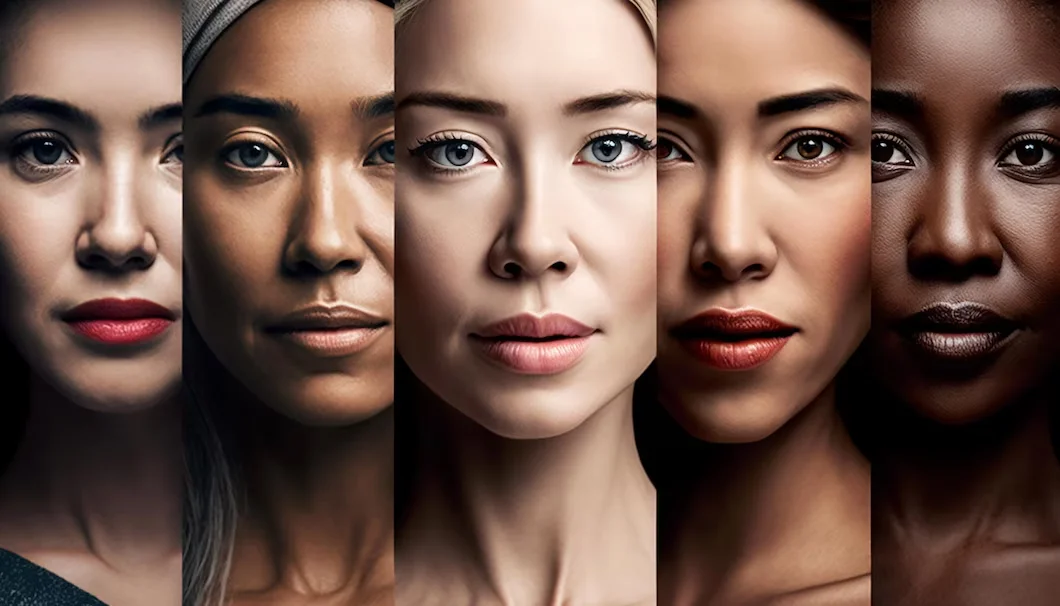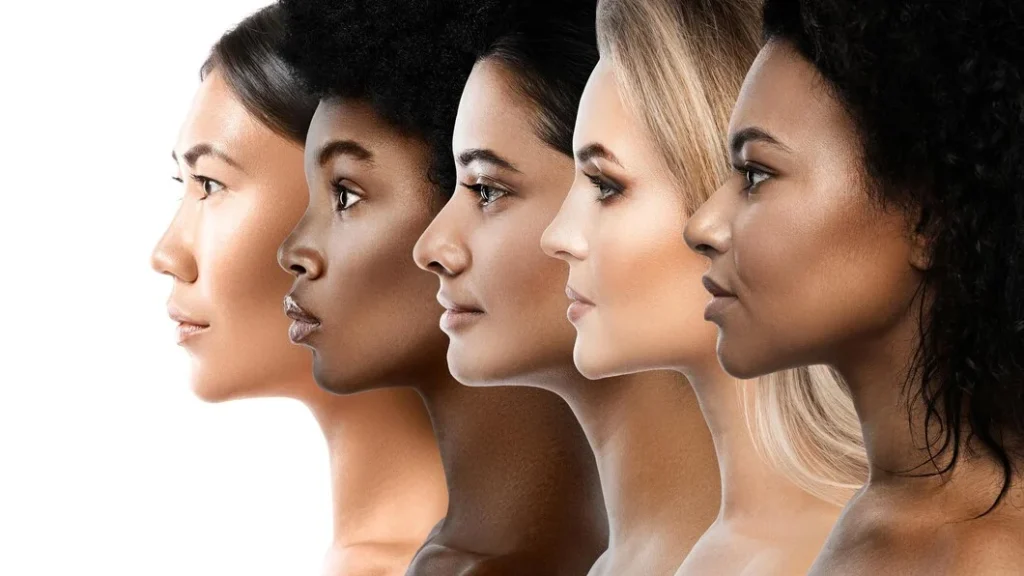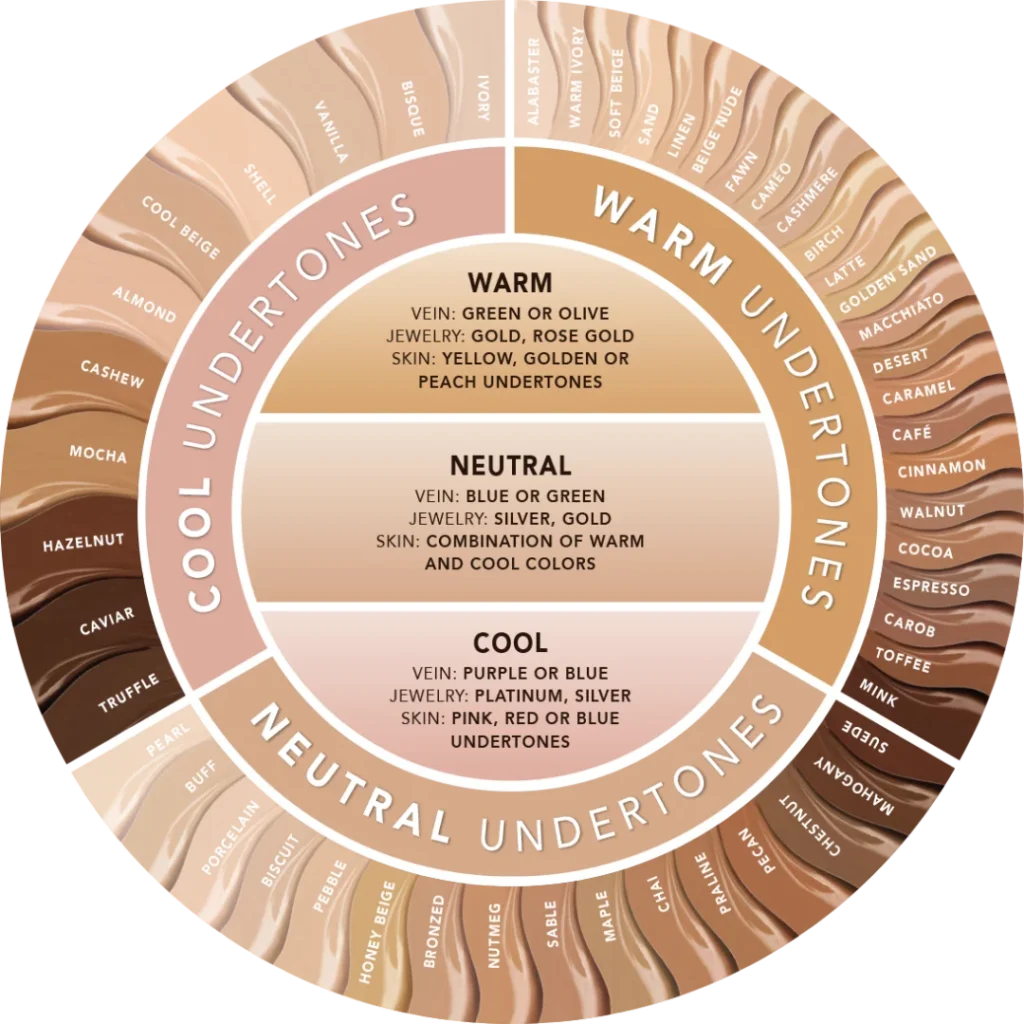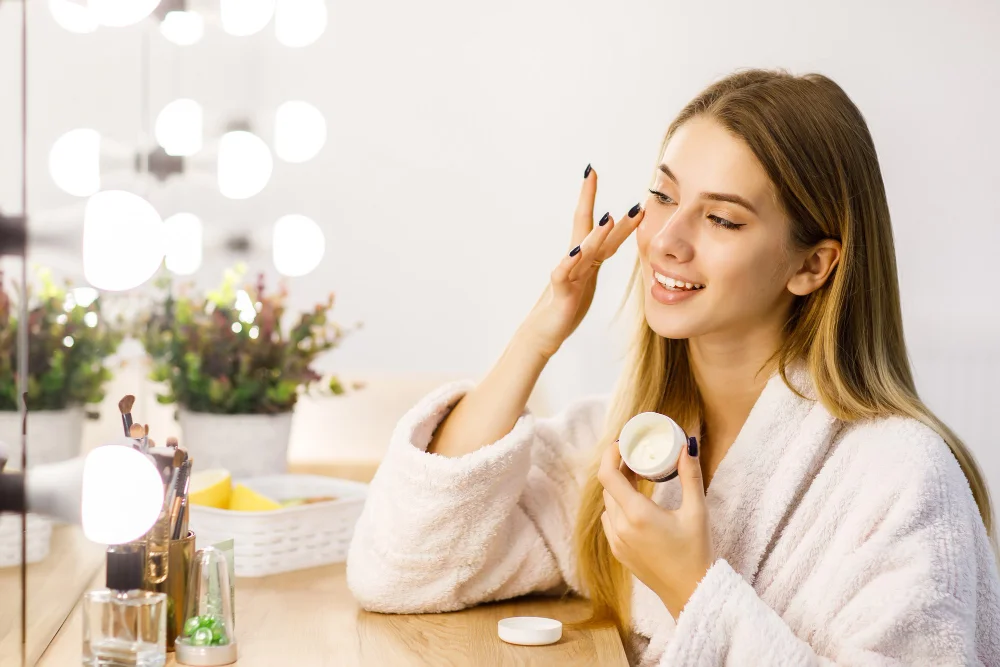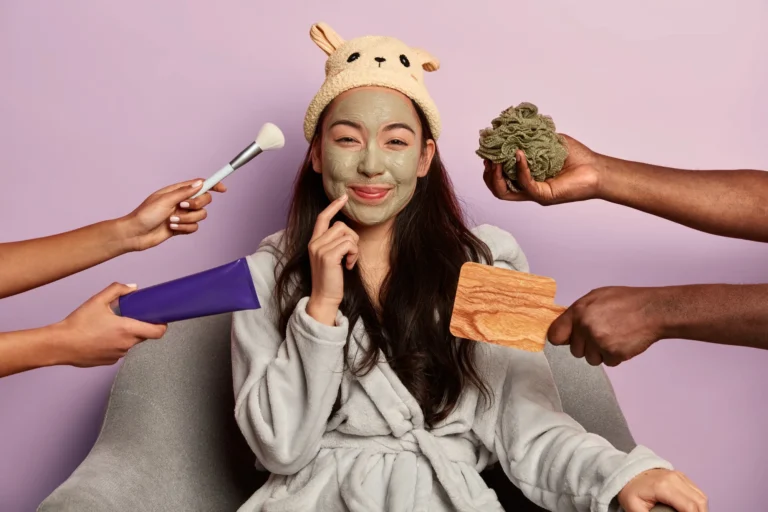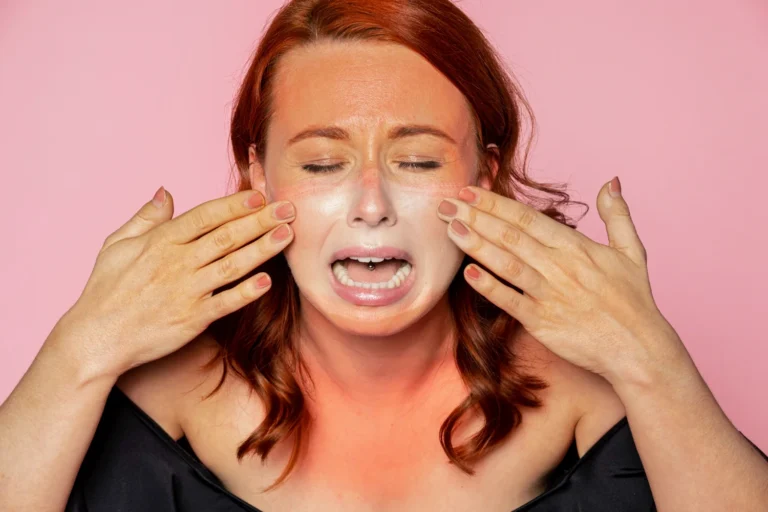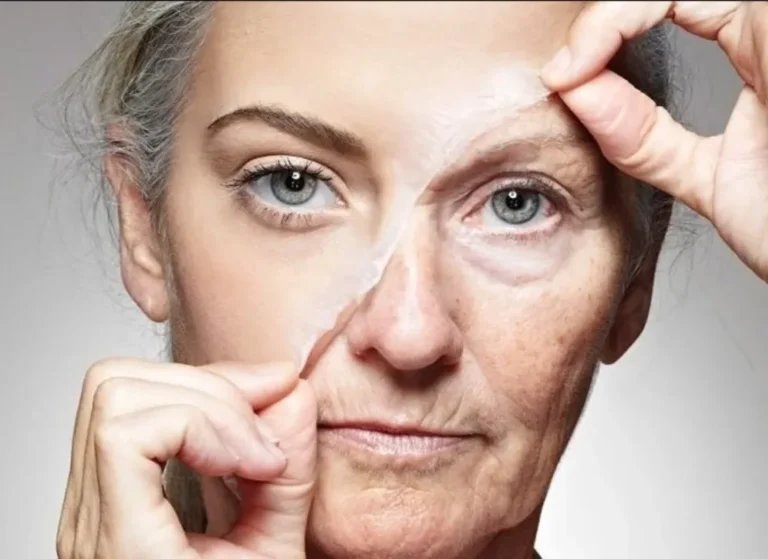Skin Tone Names: Skin Types and Skincare Tips
Melanin, the natural pigment present in the skin, significantly impacts its tone. Produced by melanocytes, melanin exists in two primary forms: eumelanin and pheomelanin. These variations determine the color spectrum of the skin, ranging from fair to deep shades, also known as skin tone names.
Eumelanin contributes to darker skin tones and offers protection against harmful UV radiation by absorbing and dissipating it as heat, reducing the risk of sunburn and damage. Individuals with higher levels of eumelanin typically exhibit deeper skin tones, while lower levels result in lighter skin tones.
Conversely, pheomelanin is associated with lighter skin tones and is prevalent in individuals with fair or pale complexions. However, unlike eumelanin, pheomelanin provides less defense against UV radiation and may elevate the risk of sunburn and skin cancer in lighter skin types.
The production of melanin is influenced by various factors, including genetics, exposure to sunlight, and hormonal fluctuations. Genetic predispositions establish baseline melanin levels, while sunlight exposure stimulates melanin production as a protective mechanism against UV radiation. Hormonal changes, such as those experienced during pregnancy or puberty, can also impact melanin production, leading to alterations in skin color.
What is Skin Tone?
Skin tone refers to the visible color of the surface layer of your skin. It’s determined by the amount of melanin (skin pigment) present in the uppermost layer of your skin. Skin tones are typically categorized into four main types: light, fair, medium, and deep (dark). These categories describe the overall shade or complexion of your skin.
What Exactly Are the Main Types of Skin Tones?
When we talk about skin tones, we’re essentially referring to the natural color and shade of a person’s skin. These tones are broadly categorized into four main types: fair, light, medium, and deep. Each type encompasses a range of hues and undertones that contribute to the overall complexion. Understanding these four main types helps us appreciate the diversity and beauty of various skin tones.
1. Fair Skin
Fair skin is light in complexion, usually with a subtle warmth like beige or peach undertones. It’s prevalent among individuals of Northern Indian descent. While fair skin may not burn as easily as extremely fair skin, it still requires sun protection and gentle skincare to maintain its health and radiance.
2. Light Skin
Light skin refers to a complexion that is fair or pale in appearance. Individuals with light skin typically have a lower concentration of melanin, which gives their skin a lighter tone. This complexion is often found among people of Northern Indian descent, although it can be present in individuals from various ethnic backgrounds across India. Light skin may be more prone to sunburn and may require extra protection from UV rays through sunscreen and seeking shade.
3. Medium Skin
Medium skin tones encompass a wide range of shades, from light caramel to warm olive. This versatile complexion is common among various ethnic groups across India, including the South Indian and North-Eastern populations. Medium skin may have a combination of cool and warm undertones, requiring tailored skincare and makeup choices.
4. Deep Skin
Deep skin tones are rich and luxurious, ranging from deep chocolate to ebony. They often have warm undertones, giving them a beautiful glow. Individuals with deep skin need to prioritize sun protection and hydration to maintain their skin’s health and vibrancy.
What is a Skin Undertone?
Skin undertone is the subtle hue underneath the surface of your skin that influences how colors appear on your skin. Unlike skin tone, which can vary based on factors like sun exposure and ethnicity, the undertone remains relatively constant throughout your life. The three main types of skin undertones are warm, cool, and neutral. Understanding your undertone is essential for selecting makeup, clothing, and hair colors that complement your natural coloring.
What Exactly Are the Main Types of Skin Undertones?
1. Cool undertone
These undertones have a hint of blue, pink, or purple in the skin.
2. Warm undertone
Warm undertones show hints of yellow, peach, or gold in the skin.
3. Neutral undertone
Neutral undertones strike a balance between cool and warm tones.
How To Determine Your Skin Tone and Skin Undertone?
Understanding your skin tone and undertone is essential for choosing makeup, clothes, and hair colors that complement your natural beauty. Here’s a simple guide to help you accurately identify them:
1. Assess Your Skin Tone:
Determine if your skin is fair, light, medium, or deep.
- Fair skin: Light complexion with pink or peach undertones.
- Light skin: Light complexion with minimal pigmentation, often with pink or peach undertones.
- Medium skin: Between fair and deep with a neutral undertone.
- Deep skin: Darker complexion with warm or cool undertones.
2. Identify Your Undertone
Look for subtle hues beneath your skin’s surface.
- Cool undertone: Blue, pink, or purple hints.
- Warm undertone: Yellow, peach, or gold undertones.
- Neutral undertone: Balance between cool and warm tones.
3. Vein Test
Check the color of the veins on your wrist under natural light.
- Blue or purple veins indicate a cool undertone.
- Greenish veins suggest a warm undertone.
- Difficulty determining it suggests a neutral undertone.
4. Consider Your Jewelry Preference
Consider your preference for silver or gold jewelry.
- Silver has cool undertones.
- Gold complements warm undertones.
- Both work for neutral undertones.
5. Skin’s Sun Reaction
Consider how your skin reacts to sun exposure.
- Easily burning and struggling to tan suggests a cool undertone.
- Tanning easily with rare burns indicates a warm undertone.
- Sunburn tendencies may vary for neutral undertones.
6. Eye and Hair Color Analysis
The eye and hair color test helps determine skin undertones. Warm undertones are associated with brown, amber, or hazel eyes and black or blonde hair. Cool undertones are linked to blue, gray, or green eyes and black or brown hair. A mix of both eye and hair colors may indicate a neutral undertone.
Why Knowing Your Skin Tone and Undertone Matters
Understanding your skin tone and undertone is essential for several reasons:
- Flawless Makeup Application: Choosing makeup shades that complement your skin tone and undertone can enhance your natural features and create a flawless makeup look.
- Effortless Wardrobe Choices: Knowing your undertone helps you select clothing colors that flatter your complexion and make you look radiant.
- Effective Skincare Routine: Tailoring your skincare routine to your skin tone and undertone ensures that you’re addressing specific concerns and maintaining healthy, glowing skin.
Confidence Booster: Embracing your natural beauty and enhancing it with the right makeup and clothing colors can boost your confidence and make you feel your best.
Skincare Tips for All Skin tone Types
Now that we’ve decoded our skin’s secret language, let’s dive into practical tips for a glowing, healthy complexion:
- Sunscreen Ritual: Shield your skin from UV rays with a broad-spectrum sunscreen. Reapply every few hours, especially during peak sun hours.
- Hydration Magic: Hydrate, hydrate, hydrate! Drink water like it’s your favorite Bollywood song. Well-hydrated skin is happy skin.
- Cleansing Love: Cleanse gently but thoroughly. Opt for mild cleansers that remove impurities without stripping away natural oils.
- Exfoliation Dance: Exfoliate once or twice a week to bid adieu to dead skin cells. Choose products with natural exfoliants, like rice flour or oatmeal.
- Moisturize Like a Pro: Lock in moisture with a lightweight, non-comedogenic moisturizer. Your skin will thank you.
- Vitamin C Elixir: Vitamin C serums are your secret weapon against dullness. Mix a drop with your foundation for that dewy glow.
- Nighttime Ritual: Before bedtime, cleanse, tone, and apply a nourishing night cream. Let your skin rejuvenate while you dream of mangoes and monsoons.
- Diet Matters: Load up on colorful fruits, veggies, and antioxidants. They’re like little love notes on your skin.
- Embrace Ayurveda: Explore Ayurvedic herbs like turmeric, neem, and aloe vera. They’ve been our beauty companions for centuries.
- Inner Glow: Lastly, wear your confidence like a radiant accessory. Your skin reflects your inner happiness.
Exploring the Top Skincare Products for All Types in India
- L’Oreal Paris Revitalift Serum: The L’Oréal Paris Revitalift 1.5% Hyaluronic Acid Serum is a lightweight serum containing Micro Hyaluronic Acid, which deeply hydrates, smooths, and reduces fine lines by up to 60%. Suitable for daily use, this fragrance-free, paraben-free, and alcohol-free formula comes in a 15-ml volume package.
- Neutrogena Hydro Boost Hyaluronic Acid Moisturizer: The Neutrogena Hydro Boost Water Gel offers intense hydration with 72 hours of moisture and 50% more hyaluronic acid. Unlike traditional moisturizers, it increases the skin’s water content for lasting hydration. Its lightweight texture absorbs instantly, leaving the skin refreshed. Suitable for all genders, unscented formula
- WOW Skin Science Vitamin C Skin Mist Toner: The Vitamin C toner hydrates, purifies, and tones the skin with natural actives like lemon and orange essential oils, witch hazel extract, and aloe vera extract. It removes impurities, tones pores, and repairs skin; it is suitable for all skin types and dermatologically tested.
- The Derma Co 1% Hyaluronic Sunscreen: The SPF 50 1% Hyaluronic Sunscreen Aqua Gel with PA++++ provides broad-spectrum protection against UVA rays and blue light. It contains hyaluronic acid and vitamin E to reduce fine lines and wrinkles while hydrating the skin. This fragrance-free sunscreen is non-greasy, absorbs quickly, and is suitable for normal, oily, acne-prone, or blemish-prone skin types.
- WOW Skin Science Green Tea Under Eye Cream: WOW Skin Science Green Tea Under Eye Cream with Rollers rejuvenates the delicate eye area with green tea, liquorice, aloe vera extract, and hyaluronic acid. It addresses dark circles, puffiness, and fine lines while being free from harmful chemicals like parabens and mineral oil. Regular use ensures supple, fresh-looking skin.
- Glow & Lovely Advanced Multivitamin Face Cream: The Glow & Lovely Advanced Multivitamin Face Cream provides a radiant glow with its advanced formula containing Vitamins B3, C, and E. It penetrates deep to brighten skin cells, offers a matte finish, and is safe for daily use, free from bleaching agents.
Skin Colors Name Chart
Skin color names refer to the various shades and tones of human skin, from light to dark, used to describe pigmentation and undertones. This chart illustrates the various skin tones, colors, and undertones, helping individuals understand and identify their unique complexion characteristics.
| Skin Tone | Skin Color | Skin Undertone |
| Ivory | Light with golden, peach, or pinkish undertones | Warm or neutral |
| Beige | Light brown with gray or yellow tints | Olive or neutral |
| Fair | Light with pink or rosy undertones | Cool or neutral |
| Light | Pale to slightly brown tones | Neutral or modest warmth |
| Medium | Beige to olive hues | Warm or neutral |
| Olive | Warm, golden undertones | Warm or olive |
| Brown | Caramel to chocolate shades | Warm or cool |
| Dark | Deeper hues with warmth or coolness | Warm or cool |
| Ebony | Deepest tones with warm undertones | Warm or cool |
| Almond | Light brown with brown or yellow undertones | Warm or neutral |
| Caramel | Warm, golden-brown hues | Warm or golden |
| Chestnut | Rich, deep hues | Warm or cool |
| Honey | Warm, golden tones | Warm or neutral |
| Mahogany | Rich, reddish-brown tones | Warm or neutral |
| Mocha | Deep, chocolatey hues | Warm or cool |
| Sienna | Warm, reddish-brown hues | Warm or neutral |
| Umber | Deep tones with warmth | Warm or cool |
| Alabaster | Bright-white skin with even tones | Cool or neutral |
| Carotenoid | Yellow-orange skin | Warm or golden |
| Tan | Light brown hues | Warm or neutral |
| Bronze | Rich, warm brown colors | Warm or golden |
| Buff | Pale yellow skin tone | Warm or neutral |
| Peaches and Cream | Warm, pinkish hues | Warm or cool |
| Praline | Warm, reddish-brown tones | Warm or neutral |
| Espresso | Dark, rich brown hues | Warm or cool |
| Porcelain | Very light, almost translucent skin | Cool or neutral |
| Hickory | Warm, reddish-brown hues | Warm or neutral |
| Mustard | Warm, golden-yellow skin | Warm or golden |
| Sable | Dark, rich brown tones | Warm or cool |
| Bisque | Light, pinkish-beige skin | Warm or cool |
| Teak | Warm, reddish-brown hues | Warm or neutral |
| Cacao | Dark, rich brown tones | Warm or neutral |
| Pecan | Warm, reddish-brown tones | Warm or neutral |
Final Thought
Understanding your skin and finding the right skincare routine can be both empowering and enjoyable. By learning about melanin’s role and recognizing your skin’s undertones, you can make smart choices to enhance your natural beauty. With simple steps like using sunscreen, moisturizers, and serums, you can keep your skin healthy and glowing. Don’t forget to explore the benefits of Ayurveda and include nourishing foods in your diet for added skincare benefits. Remember, confidence and self-love are your best beauty tools, helping you shine both inside and out, no matter your skin type or tone.
FAQs About Skin Tone Names
What are the Important steps in skincare routine?
A basic skincare routine typically consists of cleansing, toning, moisturizing, and applying sunscreen during the day. Additional steps like exfoliation, serums, and treatments can be incorporated based on individual skin concerns.
What ingredients should I look for in skincare products for anti-aging?
Look for skincare products containing ingredients like retinol, hyaluronic acid, vitamin C, peptides, and antioxidants such as vitamin E and green tea extract. These ingredients can help reduce the appearance of fine lines and wrinkles, improve skin texture, and protect against environmental damage.
How can I prevent acne breakouts?
To prevent acne breakouts, maintain a consistent skincare routine that includes gentle cleansing to remove dirt and oil, exfoliation to unclog pores, and moisturizing to keep the skin balanced. Avoid touching your face with dirty hands, and choose non-comedogenic (non-pore-clogging) skincare and makeup products.

